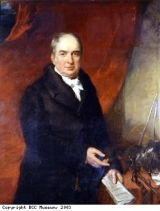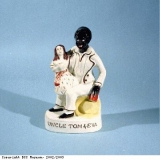The campaigners in Bristol
A committee was set up in the city of Bristol in 1823 to campaign for Emancipation (the actual freeing of enslaved Africans). The campaigners for emancipation called a public meeting. It was addressed by the anti-slavery activist, Thomas Clarkson, who was touring the country to raise support for the campaign. The meeting agreed to work for the ‘mitigation and eventual abolition of slavery in British colonies’ (meaning to make slavery less severe and eventually to end it). The Rev. Thomas Biddulph, vicar of St Matthew’s Church in Cotham, Bristol, was a member of the Committee of this Bristol Auxiliary Anti-Slavery Society. It also included seven other churchmen and thirty-one gentlemen, including members of the Fry family of Fry’s Chocolate. The Committee raised money for the main campaigning body, the London Anti-Slavery Society. They also gathered signatures for petitions to Parliament, asking for freedom for the slaves.
Other people who lived in Bristol, especially Nonconformist churchmen (that is, from religious bodies which had split from the Church of England), were involved in the emancipation campaign. The Reverend Thomas Roberts, pastor of the Baptist church in Pithay, Bristol and then in King Street, was deeply involved. He was a member of the Committee of the Bristol Auxiliary Anti-Slavery Society. In this portrait of him, his active involvement in the anti-slavery movement was symbolised by the slave chains on the table beside him. After he died, his obituary spoke of ‘his extraordinary efforts towards the emancipation of slaves and extinction of slavery in all parts of the world’. After Britain abolished slavery in 1834, he continued to campaign against slavery in the USA, South America and India. Pictured here is a figurine of Uncle Tom and Eva, characters from a book called Uncle Tom’s Cabin written by the American Harriet Beecher Stowe in 1850. It was an emotional account of slavery from a slave’s point of view. Although written by a white woman with almost no experience of slavery, it was an immediate success. The book has been seen as a major cause of the American Civil War, because it raised awareness amongst Americans of the treatment of slaves in the USA. The Civil War was mainly fought over whether the individual American states should be able to allow slavery or not. The Southern states of America supported slavery, the Northern states opposed it. The outcome of the war was the emancipation (or the freedom) of slaves throughout the USA.
William Knibb, from the Broadmead Baptist Church in Bristol, went as a missionary (a religious teacher) to Jamaica in 1824. He saw the cruelties of the slavery system and spoke out on behalf of the slaves. He made himself very unpopular with the slave-owners. In 1831, there was a slave rebellion, called the ‘Baptist Wars’, on the British owned island of Jamaica in the Caribbean. It was called the ‘Baptist Wars’ because the Baptist church and missionaries like Knibb were thought to have encouraged the slaves to rebel. It was brutally dealt with by the authorities. Over 300 of the rebel slaves were executed for their part in the rebellion. In 1832 Knibb returned to Britain to campaign for the end of slavery. An inspiring speaker, he travelled the country preaching against slavery. He reportedly took a set of slave chains to meetings, to show the conditions under which slaves lived and worked.




